FE&S’ 2012 Dealer of the Year combines a family-like atmosphere, a sales-oriented foundation and an array of ever-evolving revenue streams to create a foundation for success that appears poised to withstand the tests of time.
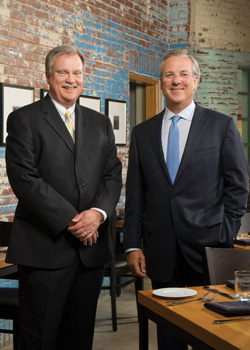 Always open to new ideas to help better serve customers, Mission Restaurant Supply partnered with San Antonio restaurateur Mark Bliss to open a facility that serves as a test kitchen for the dealership by day and a restaurant by night. Seen here smiling in the restaurant’s dining room are Mission President Andy Wueste (left) and CEO Jack Lewis.The concept of sustainability remains a prominent topic among most foodservice professionals these days; when they discuss the topic much of the dialogue centers on how best to source ingredients or lower water use. Rarely, however, does the discussion turn to creating a sustainable business, one that makes the best use of its resources without depleting them and thus positions the organization to withstand the tests of time.
Always open to new ideas to help better serve customers, Mission Restaurant Supply partnered with San Antonio restaurateur Mark Bliss to open a facility that serves as a test kitchen for the dealership by day and a restaurant by night. Seen here smiling in the restaurant’s dining room are Mission President Andy Wueste (left) and CEO Jack Lewis.The concept of sustainability remains a prominent topic among most foodservice professionals these days; when they discuss the topic much of the dialogue centers on how best to source ingredients or lower water use. Rarely, however, does the discussion turn to creating a sustainable business, one that makes the best use of its resources without depleting them and thus positions the organization to withstand the tests of time.
Well, that is exactly what the 233 employees of Mission Restaurant Supply have done. Under the leadership of Jack and Liza Lewis, the husband-and-wife team that own the company, and Andy Wueste, the dealer’s president, Mission has evolved from a company that sold packaged ice (the cubes and not the machines) into one of the fastest-growing and highly respected foodservice equipment and supplies dealerships in the country.
“It took us no time to figure out that there was very little business for packaged ice in the wintertime. So we looked for ways to diversify our revenue,” Lewis says. And the company has continued to grow and evolve ever since.
During the past five years, when many companies were happy to hold their own during very turbulent economic times, Mission watched its revenues increase 60 percent to $90.5 million. “We have revenue coming from a variety of directions, and the employees know not everyone is going to have a banner year every year,” Lewis says. “We don’t have the pressure that a company in just one kind of business has. So the diversifications we have mean we are not affected by the cycles quite like others in the industry are.”
Today a number of different foodservice-related businesses continue to thrive like, well, one big, happy family under the Mission roof. The company has branch locations throughout Texas in Austin, Corpus Christi and McAllen, which offer cash and carry, street sales, and contract services. Mission also has its own metal fabrication shop, refrigeration service business and ice machine wholesale distributorship in Houston. Together, these sibling entities help create a relatively stable business environment.
“All of this has kind of happened without a plan. I had no idea I wanted to be in the ice business until a business became available,” Lewis says. “So in time, through a series of evolutions, we grew and sold the ice business and kept the leasing business. By design we still don’t have a plan, and there are definitely times when we do fly by the seat of our pants. But mostly we have been opportunistic and entrepreneurial. So when an opportunity comes along, we assess it, and if it is the right thing to do we jump on it. If not, we pass. So much of our opportunity is in the form of people.”
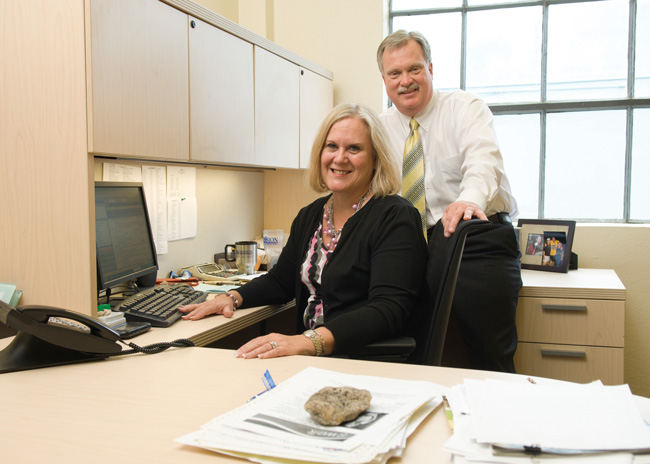 When Andy Wueste joined Mission Restaurant Supply in 2003, he helped established the dealership’s contract and bid department. And keeping with Mission’s family-like environment, Wueste’s wife Marilyn (seen here) joined the dealership in the contract and bid department.
When Andy Wueste joined Mission Restaurant Supply in 2003, he helped established the dealership’s contract and bid department. And keeping with Mission’s family-like environment, Wueste’s wife Marilyn (seen here) joined the dealership in the contract and bid department.
Supercharging the Business
One of those people-based opportunities popped up in 2003. The dealership entered the contract business when Wueste was looking for a new business challenge. “Mission was doing a great job with service, installation, leasing and sales,” Wueste says. “And when I came over and the contract department began to expand, it just supercharged. We brought in some construction and resupply knowledge, and things just caught fire. They welcomed us in like family.”
Wueste broke into the foodservice industry in 1980, working part-time in the warehouse of another dealership while going to school to earn a degree in criminal justice to help fulfill his goal of being a police officer. As Wueste was weighing a move to College Station to attend Texas A&M, the dealership offered him a full-time position. He accepted the position and Wueste’s career progressed from the warehouse to showroom sales to street sales to sales manager and then to general manager. “I learned the business from the back to the front,” he says. “We are very grassroots and that’s what’s so great about our industry — it gives a lot of people opportunities.”
When he eventually decided it was time to pursue a new opportunity, Wueste was not exactly sure what that opportunity should look like. So he decided to keep an open mind as to what would come next in his career. “I had visited with some close friends and customers, and one told me not to do anything until I checked out two or three options,” he says.
So at the suggestion of Bill Sheridan, a mutual friend who ran a restaurant where both Wueste and Lewis like to eat, the pair briefly met one day. Shortly thereafter, Lewis and Wueste spent a day visiting each of Mission’s locations, visiting with the employees along the way. “In that visit it was obvious how engaged the employees were,” Wueste recalls. “They were happy to see Jack, and he was happy to see them. At the end of the day, I told him ‘Even if I don’t join your company, I will steer my customers to you’ because I knew they would be well taken care of.”
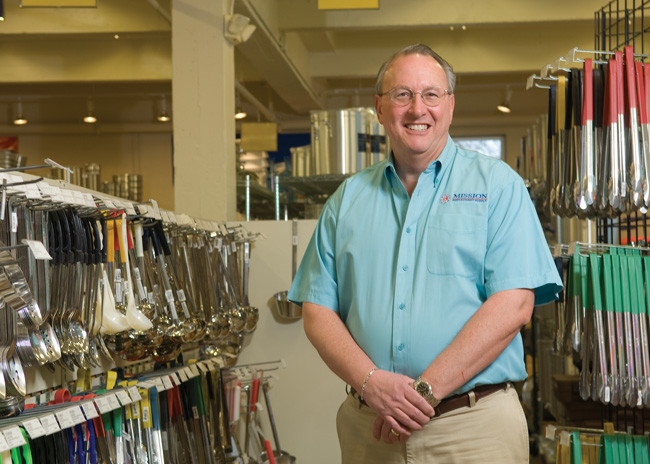 Although he serves as showroom manager for Mission Restaurant Supply’s San Antonio location, former restaurateur Tim Dwyer (above) does more than help customers find the products. He explores menu compositions and more to help these foodservice operators develop sustainable businesses. In addition, all of the Mission employees work collaboratively to help solve problems or even pitch in to assist with inventory.
Although he serves as showroom manager for Mission Restaurant Supply’s San Antonio location, former restaurateur Tim Dwyer (above) does more than help customers find the products. He explores menu compositions and more to help these foodservice operators develop sustainable businesses. In addition, all of the Mission employees work collaboratively to help solve problems or even pitch in to assist with inventory.
Lewis and the Mission employees were equally impressed with Wueste. “We spent a couple of days discussing the corporate culture we are trying to achieve, and he agreed that was what he wanted. The employees liked him right away, so he left his previous position and came to work with us.”
When Wueste joined Mission, a number of colleagues from his previous company, who were also looking for new employment opportunities within the foodservice industry, followed suit. “We had an instant fab shop because Andy knew people from his previous job that were out of work,” Lewis recalls.
“Most of our growth has been organic; but Andy was a hire from the outside, and he was a real game changer for us,” Lewis says. “It was Andy’s joining us that really got us into the bid-contract business. We had dabbled in it up to that point. He had a lot of experience and knew a lot of people in the rep community. So he brought us some credibility we were struggling to acquire on our own.”
It did not take long for Wueste to establish his credibility among the Mission team, either. “Pretty soon, by virtue of the way he operates, people gravitated to him. He’s a natural leader,” Lewis says. Realizing this, Lewis tried to promote Wueste to president of Mission on three different occasions, only to be turned down because Wueste felt he had not yet earned the position.
By the time Wueste accepted the position, he was already filling the role and Lewis was functioning in more of a CEO role, looking for new opportunities that would allow the company to evolve. “We are always looking for a home for our internal managers. All of our management has been developed from within. Everybody started in sales and worked their way up. We recognize the talent these people have,” Lewis says. “My job is to make sure that we find a place to suit all of the people that want to do better, make more money and have more opportunities.”
Success Rooted in Sales
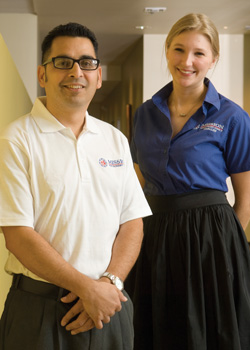 As Mission Restaurant Supply’s e-commerce manager, David Limon leads a team of 12 people. Each time the dealership makes an online sale a member of the e-commerce team rings a bell, something they’ve been doing a lot more of lately. Sallie Lewis serves as online marketing and social media manager, looking to forge customer relationships and engagement in the Internet world.In addition to family values, another key attribute of Mission’s success is the fact that the dealership is a sales organization at its core. Most of its key managers got their start in sales and worked their way up from there. In fact, many still have a few accounts they call on despite the fact that their role with the company has evolved considerably over time.
As Mission Restaurant Supply’s e-commerce manager, David Limon leads a team of 12 people. Each time the dealership makes an online sale a member of the e-commerce team rings a bell, something they’ve been doing a lot more of lately. Sallie Lewis serves as online marketing and social media manager, looking to forge customer relationships and engagement in the Internet world.In addition to family values, another key attribute of Mission’s success is the fact that the dealership is a sales organization at its core. Most of its key managers got their start in sales and worked their way up from there. In fact, many still have a few accounts they call on despite the fact that their role with the company has evolved considerably over time.
“We have never had to go out shopping for new managers because someone in the company has always been ready to step up,” Lewis says. “What you need to run this business you don’t learn in school. But what’s great about this industry is that if people have a strong desire to succeed, they can start at the bottom, and the sky’s the limit for them. If you take the time to learn the business, have good customer skills and a strong work ethic, you can move up.”
Allowing people to pursue their passions within the business remains another critical element in Mission’s continued evolution. In the case of Tim Dwyer, showroom manager in the San Antonio location, that extends beyond simply helping customers find the right tool or piece of equipment to meet their needs. He goes even deeper, exploring menu compositions and more, drawing on his more than 25 years of experience in the restaurant industry. “I enjoy the part about helping them figure out the gross margin on a menu item,” he says. “I can’t wait to get up in the morning and come to work. You get to deal with different customers and challenges every day. I enjoy being able to share those many years of experience I have with our customers. If we make a mistake, we take ownership and do the right thing. There’s a lot of integrity here. We will not sweep things under the rug.”
Excited about E-Commerce
One opportunity that has Lewis’ attention these days is the company’s budding e-commerce business. “We thought we needed to do this. There are only so many places where you can add stores that make sense,” Lewis says. “So for us, this was a way to open a new store without having to acquire a new building. We have some very talented people there guiding us now.”
Leading Mission’s e-commerce business is David Limon, who joined the dealership eight years ago. In his role as Mission’s e-commerce manager, Limon leads a team of 12 people. “It is really growing,” Limon says about his corner of the dealership. “We had a few bumps along the way because the world of e-commerce is always changing. But I think we are getting better all the time. It is really new, and people need to understand it is a different beast. It is not like running your typical brick-and-mortar store.”
For example, traditional orders placed through a salesperson or via the phone are typically picked in the warehouse and compiled into one shipment. While this is the goal with online sales, too, there tend to be some exceptions. “With the Internet site you can sell a lot of products that you don’t ever have to touch,” Limon says. In those instances, Mission will coordinate drop-shipping to the customer with the factories.
 Duane Moeller, General Manager, Austin branch We want our customer to feel comfortable and confident they have made the right choice about who to do their business with. We want long-term relationships so if it is not done right we have to take ownership. We don’t leave people hanging.
Duane Moeller, General Manager, Austin branch We want our customer to feel comfortable and confident they have made the right choice about who to do their business with. We want long-term relationships so if it is not done right we have to take ownership. We don’t leave people hanging.
In addition, product shipping represents a different challenge in the Internet world. For the most part, items ordered within the dealership’s geographic markets get delivered by Mission’s trucks. That means the employees have more control over the items in transit. When shipping Internet orders, however, Mission’s common practice is to use third-party carriers, which means the dealer loses control. “So we try to pack it well and do it right to begin with to avoid an item arriving damaged,” Limon says. “We also educate our customer on the importance of inspecting their shipments so they know what they are getting.”
Customer education represents an often-overlooked component of online selling. That’s because customers often don’t realize the subtle differences between products. For example, not all white china is exactly the same shade of white. Not realizing this can lead to a customer ordering the incorrect item. So, to be successful, online suppliers like Mission need to be able to keep their customers from making simple mistakes; they do this by asking questions when returning customers purchase something that is inconsistent with their order history. “You need to see to it that that customer’s needs are being met,” Limon says. “Change orders were a big deal, and we had to learn how to deal with that. But it is getting better and a lot of that has to do with learning how to educate the customer.”
Once a customer has been on the Mission site for 60 seconds, a chat feature appears, allowing the customer to initiate a conversation with one of the dealer’s online sales reps if desired. Once the customer places an order, the Mission team reviews even the smallest details. For example, if the customer orders a fryer, someone will make sure the correct casters were selected. “That helps everyone to make sure the order is right before shipping it out. We are trying to develop long-term relationships,” Limon says. “Everyone is beating each other up on price. So what makes you stand out? Service.”
Of course, in order to develop that long-term relationship, Mission first has to draw the customer to its site. Given the noisy nature of the online world, marketing represents a key factor in cultivating any e-commerce site, and Mission is no exception to this rule. For that reason, Limon and his team employ a full arsenal of marketing weapons, including search engine optimization, social media and much more. The net result can be a significant price tag.
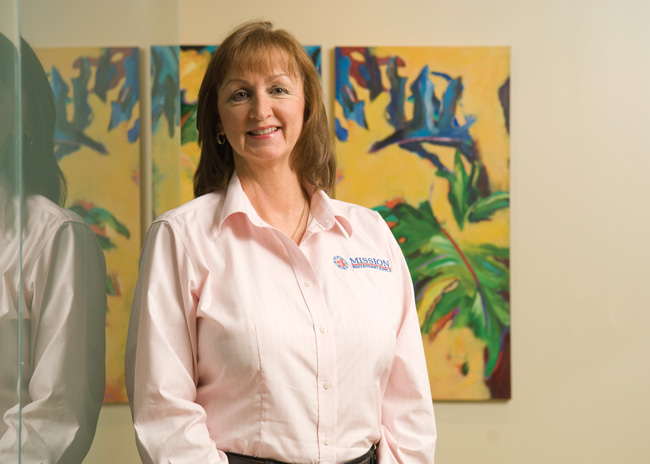 Brenda Weil, Vice President of Marketing Everyone has a sense of self-motivation. You don’t have to tell people what to do around here. They just know to do it. That’s because we are all one extended family and are committed to the company’s success.
Brenda Weil, Vice President of Marketing Everyone has a sense of self-motivation. You don’t have to tell people what to do around here. They just know to do it. That’s because we are all one extended family and are committed to the company’s success.
Mission uses social media as a business tool to drive traffic to its website and educate its customers. “It is a great way to interact with your existing customers,” Sallie Lewis says. “We are definitely growing our online presence, and people are starting to catch on more and more.”
The key to social media success, according to Sallie Lewis, is being authentic, and keeping your voice professional and consistent. Each of these attributes is consistent with the way Mission approaches every aspect of its business. “You have to put the customers first and think about how they can benefit,” she adds. “You don’t just put out useless information. Social media is such a new way of branding and a way to put your company’s voice out there. It is an important part of doing business today, and we have made exciting new relationships as a direct result.”
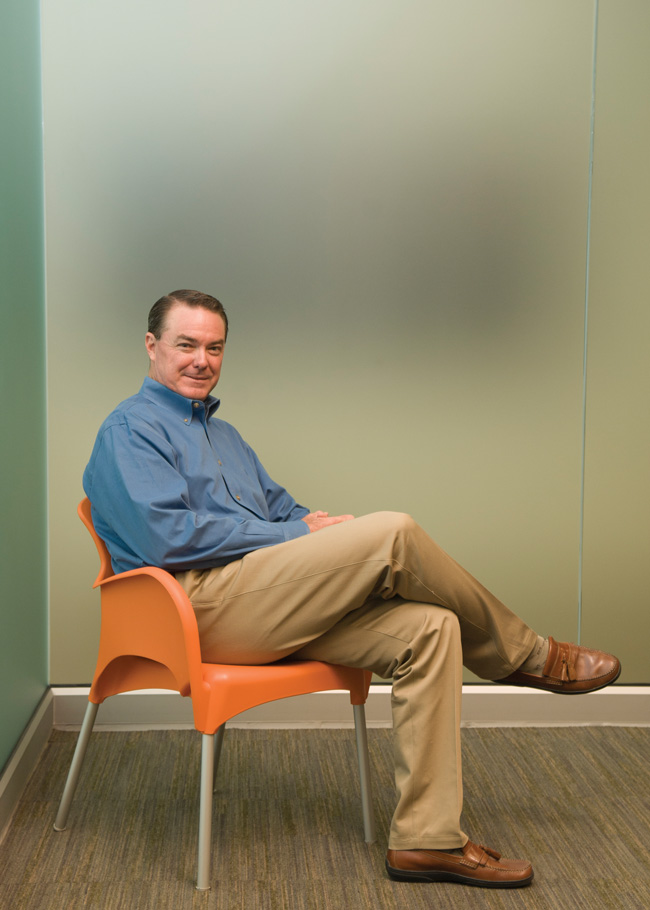 Jon Triplett, Chief Financial Officer We spend a lot of time looking at where the company is, where it is going and how each person can help with that.To ensure the dealership’s new site would meet the company’s standards for quality and customer service, Lewis had Limon and other members of the web-store team meet with representatives from online retailer Zappos, giving them the opportunity to learn from the best. “Things like that are really important to me, and I think it says quite a lot about Jack.”
Jon Triplett, Chief Financial Officer We spend a lot of time looking at where the company is, where it is going and how each person can help with that.To ensure the dealership’s new site would meet the company’s standards for quality and customer service, Lewis had Limon and other members of the web-store team meet with representatives from online retailer Zappos, giving them the opportunity to learn from the best. “Things like that are really important to me, and I think it says quite a lot about Jack.”
And the fact that the site’s growth remains on an upward trajectory only seems to fuel Limon’s entrepreneurial fire. He regularly plugs into the company after hours and on weekends to make sure the website and other aspects of the business keep moving along. “I love it,” Limon adds without hesitation. “And I am not done here. We have a long way to go, and I want to see us get to that next level. I don’t see myself ever leaving.”
And it would seem as if Limon’s e-commerce department, like the others, gets the support from management that’s necessary to thrive. “Your competition expands tenfold online. And you can’t make it work unless you get the support from the people up high, Limon says. “Jack has a strong entrepreneurial spirit, and that’s what he expects from us. He gave me the opportunity to run my own business here. He tells us to do what we need to make it happen and trusts our judgment. That allows that entrepreneurial spirit to run through the company.”
As a result, Limon approaches his role as e-commerce manager the way most budding entrepreneurs would their own businesses. Limon first built the company’s e-commerce site seven years ago, loading in the content, setting up the credit card processing and more. He even taught himself about online marketing. “I slept about two hours a night for weeks,” Limon recalls. “I was confident I could do this but had never done anything like this on that scope.”
And it appears as if that confidence and persistence is ready to pay dividends. “We have never lost our focus to eventually get there. It is not the easiest business we run, and it has the most condensed margins of any business we run,” Lewis says. “I think it is one of those things that, if you stay the course and get it right, it will be a very profitable part of our business. It has taken some time, but we are finally making some progress there.”
Mission’s By-the-Book-Culture
 Sherry Kruciak, Vice President When people love their job it shows. You will hear more laughter around here than raised voices. What gave the Mission team the ability to keep its head while everyone around them was losing theirs, as Rudyard Kipling might put it, was an unwavering trust in the company’s leadership and the dealer’s family-values-oriented culture. Many companies may say they treat their employees like family, but the Mission team truly backs it up with their thoughts and their actions.
Sherry Kruciak, Vice President When people love their job it shows. You will hear more laughter around here than raised voices. What gave the Mission team the ability to keep its head while everyone around them was losing theirs, as Rudyard Kipling might put it, was an unwavering trust in the company’s leadership and the dealer’s family-values-oriented culture. Many companies may say they treat their employees like family, but the Mission team truly backs it up with their thoughts and their actions.
“When the economy slowed down, the attitude around here was, ‘We are okay and the business is stable so just keep doing what you have been doing.’ And that got us through it all,” says Brenda Weil, Mission’s vice president of marketing and a 20-year company veteran. “There was a lot of negativity in the marketplace, but we chose not to participate in any of it.”
Indeed, from top to bottom, everyone on the Mission team is proud not only of the fact that the company continues to thrive and evolve but also of the way it goes about its business. “It is a whole different company, and it is a much better company,” says Betty Yost, who has been with Mission since 1979, save for a brief hiatus during which she worked for a software company. “We are one of the few companies today that is really secure. We don’t have layoffs, and we continue to grow. The business is well run, and they take care of it the right way.”
Realizing that the company’s family-like culture was one of its true differentiating factors prompted Lewis to almost literally take a page from the book of Zappos executive Tony Hsieh. Lewis had read that Hsieh asked the Zappos employees to share with him their thoughts about the online retailer’s corporate culture. So in February 2011, Lewis sent an email to all Mission employees asking them to do the same.
Sallie Lewis collected the responses and five months later had turned it into the 106-page bound document that commits the Mission’s true colors to writing in a format that the company can proudly share with customers, vendors and other business partners.
“Everyone defines culture in their own way. So I had to look inside myself to see how I define it. And for me, it came down to the people, how we treat each other and our working environment,” says Sherry Kruciak, a vice president with the company who serves multiple aspects of the business. Kruciak has been with Mission for 24 years.
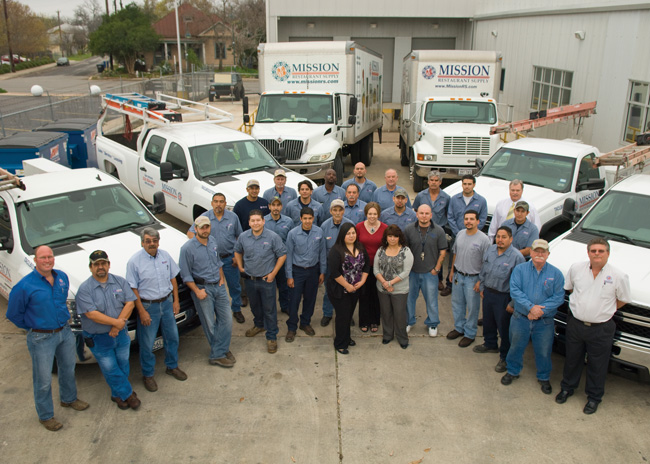 The Mission Restaurant Supply’s service division breaks from their Monday morning meeting and prepares to hit the streets. One of the keys to the stability of Mission Restaurant Supply is its diverse revenue streams, like the service arm of the business.
The Mission Restaurant Supply’s service division breaks from their Monday morning meeting and prepares to hit the streets. One of the keys to the stability of Mission Restaurant Supply is its diverse revenue streams, like the service arm of the business.
What’s even more impressive about the document is that it allows the individual voice of each employee to come through loud and clear and unfiltered. “People knew their submissions were going to be unedited, and they responded. Everyone had a different tone, and that let their personality shine through,” Sallie Lewis says. “It created an understanding as to who we are and what we stand for as a company. There is something about seeing your name and thoughts in print that makes it special.”
The information her colleagues shared in the Mission culture document seemingly struck a chord with Kruciak and others. “It talked about what we did as a family and a group. It had a theme of appreciation of the Lewis’ creating an atmosphere that allows you to enjoy coming to work,” she says.
The creation of the culture book is representative of the type of open, unfiltered feedback Lewis encourages employees at all levels of the company to share with one another. “Everyone in the company feels like they can knock on his door and share their perspective about how to improve things,” Sallie Lewis says.
Of course, it is one thing to document a company’s culture and another to continue to nurture it and embrace it in the way you go about your business. And at Mission, walking the talk starts at the top. “You spend two-thirds of the hours you are awake every day at the office. So if you are not happy to be there and they don’t feel like your second family, then you should not be there,” Lewis says.
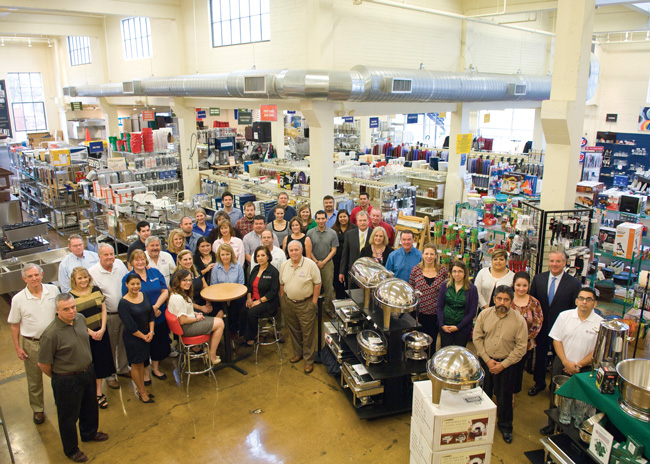 As the business has grown so has the Mission Restaurant Supply family. Today, the company employs 233 people, up from 89 just 10 years ago.
As the business has grown so has the Mission Restaurant Supply family. Today, the company employs 233 people, up from 89 just 10 years ago.
Although she holds no official title, Liza Lewis continues to have a positive impact on the company and its culture. She hosts a retreat for the female employees and serves as a sounding board for many of Mission’s team members on a regular basis. “She is greatly respected by the people here,” Lewis says. “She’s here not ever to manage anyone but to be a friend. When she walks through it is fun to witness because everyone wants to see her.”
To help promote the family-like atmosphere, Lewis holds company retreats at his family ranch where they review everyone’s performance and that of the overall business. “Everyone understands that as a group we all have to do well,” Lewis says. “So when someone is struggling another manager rises up.”
When someone notices a teammate in need of help they often will pitch in, regardless of which department they work in or how mundane the task. For example, Kruciak says it is pretty common for people from various parts of the company to offer to help with inventory. “You involve people in other parts of the business beyond their regular duties,” she says. “We have an environment that allows people to grow and learn more.”
 The second oldest of Jack (right) and Liza Lewis’(center) three children, Sallie Lewis (left) joined Mission Restaurant Supply after she graduated college, and now serves as the dealer’s online and social media manager. Liza Lewis has no official title within the business but holds a retreat for the female employees and serves as a sounding board for Mission team members. Sallie’s older sister Fannie spent time working at Mission before departing San Antonio for New York City, where she now works as a jewelry designer. And Sallie’s younger brother A.J. is a student at Texas Christian University, where he is studying business.It is important that the warm, family-like culture emanating from the San Antonio office remains omnipresent in Mission’s other locations, like Austin. That begins with clear, concise and consistent communication among the branch managers, their colleagues in other parts of the business and Mission’s management. “I feel I know a lot of what Jack expects of me as a general manager of one of the dealership’s locations. It is a very casual rapport, but we do stay in touch. Having the kind of relationship where you can throw anything on the table with Andy and Jack gives me what I need to keep the office going and is incredibly valuable,” says Duane Moeller, general manager of Mission’s Austin branch.
The second oldest of Jack (right) and Liza Lewis’(center) three children, Sallie Lewis (left) joined Mission Restaurant Supply after she graduated college, and now serves as the dealer’s online and social media manager. Liza Lewis has no official title within the business but holds a retreat for the female employees and serves as a sounding board for Mission team members. Sallie’s older sister Fannie spent time working at Mission before departing San Antonio for New York City, where she now works as a jewelry designer. And Sallie’s younger brother A.J. is a student at Texas Christian University, where he is studying business.It is important that the warm, family-like culture emanating from the San Antonio office remains omnipresent in Mission’s other locations, like Austin. That begins with clear, concise and consistent communication among the branch managers, their colleagues in other parts of the business and Mission’s management. “I feel I know a lot of what Jack expects of me as a general manager of one of the dealership’s locations. It is a very casual rapport, but we do stay in touch. Having the kind of relationship where you can throw anything on the table with Andy and Jack gives me what I need to keep the office going and is incredibly valuable,” says Duane Moeller, general manager of Mission’s Austin branch.
Mission also has the financial management tools in place to track the performance of each cost center. The key metrics that Mission tracks are pretty simple and straightforward, matching its business philosophy. They include revenue, cost of goods sold and expenses. And the company has monthly financial reviews so managers can see how their areas are performing. Also, the managers set their own expectations for their business units each year. “We also spend a lot of time focusing on where the company is, where it is going and how each person can help with that,” says Jon Triplett, Mission’s chief financial officer and a 15-year company veteran.
This creates a sense of accountability not only to the company but to each other, too. “There is no pressure here,” says Dwyer. “Everyone goes about their business to the best of their abilities. As a result, people want to do the best they can to make the company successful.”
While the managers of each location and business unit remain keenly aware of what their branch needs to accomplish to be successful, they also understand where their particular business unit fits in the overall scope of things. “Jack has always been an open book with the management of the company. And it is not just open with you about your business unit — he shares information about the entire company. That helps everyone see how they are a part of something bigger,” Triplett says. “He is as macro as you can get. He knows the direction he wants to go and relies on the people that work here to take us there. He understands that the employees own that and make it happen. And he appreciates that. It makes you feel like you are more than an employee.”
Along those lines, the people in charge of the individual units then have the flexibility they need to properly run their businesses. “Jack is counting on his managers to make the right decisions,” says Moeller. “We are all very aware of our locations’ performance, and we have to do what makes sense. And I think that’s why we are where we are today — because they challenge us and encourage us to be creative.”
And that creative and flexible philosophy extends to conflict resolution, too. “If I made a mistake, I would go to Andy and Jack and explain what I did and offer a suggestion about how to correct it,” Dwyer says. “It’s that way in every department. The bottom line is always, ‘What are we going to do to make it right for the customer?’”
Lewis adds, “On some of the biggest mistakes that are made, I don’t have to say a word — so long as it was not something caused by a lack of effort. There’s no point in rubbing someone’s nose in a mistake. If I see someone not trying, then we know we need to make a change.”
 As Mission Restaurant Supply continued to evolve, the dealership added various business units that would better support its customers. One such example is the fabrication shop, where Mando Fernandez (above) works.
As Mission Restaurant Supply continued to evolve, the dealership added various business units that would better support its customers. One such example is the fabrication shop, where Mando Fernandez (above) works.
Spirit of Gratitude
Despite all of the company’s success of late, the Mission team remains incredibly humble and continues to feel grateful for the good fortune their efforts have helped generate. Along those lines, Mission remains very active within the community through philanthropy. Generally speaking, the company’s gifts focus on supporting the basic needs of children and education.
“There are a lot of people in this community that do not have the opportunities that I grew up with,” says Lewis. “Our culture dictates that we financially support the needs of children, both physical, emotional, as well as educational, within our community in a meaningful way every year.” Lewis adds that the company donated 20 percent of its after-tax profit to charity in 2011. “It is of paramount importance to see San Antonio and South Central Texas continue to evolve when it comes to supporting education and the children’s needs. This company has given me the ability to follow through to ensure that continues.”
As a symbol of how fortunate they feel to be a part of the Mission family, the employees have established The Mission Restaurant Supply Scholarship Fund in the name of Jack and Liza Lewis. Each year this fund sends a student to St. Philips College with a full scholarship to study culinary arts. “We feel fortunate to have what we have so, it is important to help others,” Kruciak adds.
When it comes to Mission’s future, only one thing is certain: the company will continue to evaluate new opportunities as they arise, aligning with those that support its corporate environment. For example, earlier this year the dealership partnered with San Antonio restaurateur Mark Bliss to convert a historic gas station into a facility that serves as a test kitchen for Mission by day and a fine-dining restaurant by night.
Pairing that sense of adventure with an entrepreneurial spirit will continue to fuel Mission’s sustainable business model for years to come.
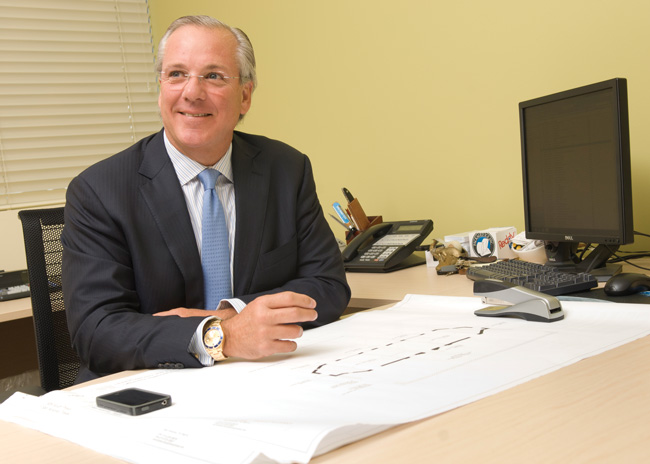 Before breaking into the foodservice industry Mission Restaurant Supply CEO Jack Lewis worked as an attorney, specializing in mergers and acquisitions.
Before breaking into the foodservice industry Mission Restaurant Supply CEO Jack Lewis worked as an attorney, specializing in mergers and acquisitions.
Timeline
- 1988: Jack and Liza Lewis buy Mission Party Ice in March; form Mission Ice Equipment Company, leasing ice machines in San Antonio; and establish leasing offices in Austin and Corpus Christi.
- 1990: Becomes San Antonio ice machine distributor and forms
Southwest Texas Equipment Distributors (STED Inc). Mission starts leasing other forms of commercial refrigeration
equipment, too. - 1991: Lewis buys an ice distributor in Houston and opens a second office for STED Inc.
- 1995: Mission Party Ice merges with another ice distributor,
was sold to Packaged Ice. Buys warehouse and offices
at 1227 S. St. Mary’s in San Antonio and relocates Mission Ice Equipment Company and STED Inc. - 1999: Becomes a member of buying group NAFED and starts selling foodservice equipment and supplies.
- 2001: Expands into the restaurant supply business, opens a small showroom in a former hardware store at 1315 S. St. Mary’s St. Changes name to Mission Restaurant Supply. Builds new facility and warehouse in Corpus Christi and opens a second showroom.
- 2003: Mission relocates to a new facility and enters the Austin market with a new restaurant supply showroom.
- 2003: Andy Wueste joins Mission Restaurant Supply to form the contract and bid department. Four other foodservice professionals come aboard from another dealership to help Wueste establish this department.
- 2004: Mission purchases metal shop Kruse-Forestier, naming it
Mission Metal Fabricators and making it the dealership’s fabrication shop. Opens full e-commerce website MissionRS.com at the San Antonio facility. - 2005: Purchases a former uniform company at 1126 S. St. Mary’s. Remodels the facility, relocates the showroom and expands
the warehouse operations. - 2007: Mission employees establish a college scholarship for culinary arts in the name of company owners Jack and Liza Lewis.
- 2009: Andy Wueste promoted to president of Mission Restaurant Supply, and Jack Lewis becomes the company’s CEO.
- 2010: Mission purchases a 132,000-square-foot warehouse and
distribution center in San Antonio. Joins buying group CPG
in January. - 2011: Mission Restaurant Supply opens its fourth location in McAllen, entering the Rio Grande Valley market.
- 2012: Remodeled old 1930s gas station across from San Antonio showroom to become first test kitchen.
- 2012: FE&S names Mission Restaurant Supply its 2012 Dealer of the Year




